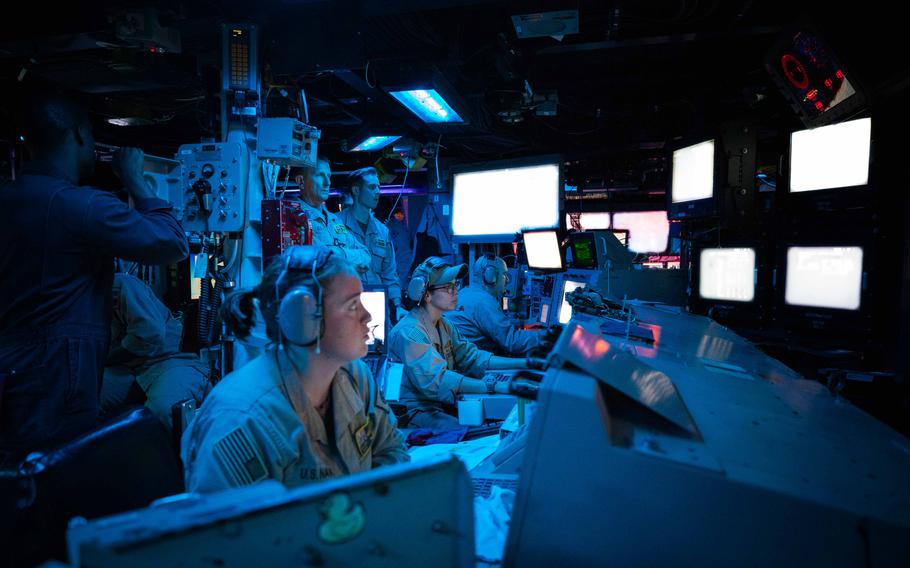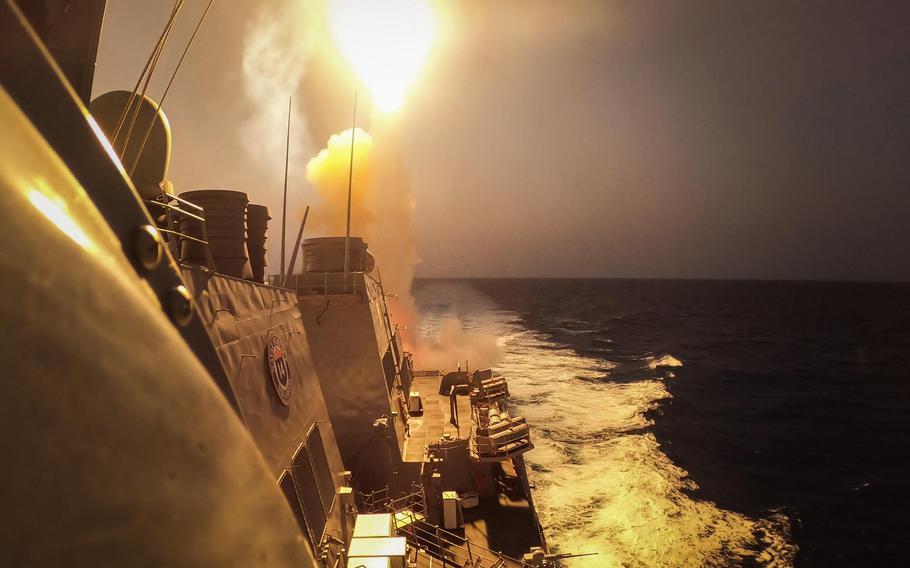
Sailors aboard the destroyer USS Carney stand watch during an operation to defeat a combination of Houthi missiles and aerial drones in the Red Sea on Oct. 19, 2023. (Aaron Lau/U.S. Navy)
The U.S. has sanctioned 13 businessmen and firms that it accuses of helping fund the Houthis, a militant group in Yemen that has engaged in lengthy firefights with U.S. Navy ships in the Red Sea in recent weeks.
The sanctions, announced Thursday, target a financial network that the U.S. says channels money from Iran to the Houthis. The economic measures represent one of the few ways the U.S. has publicly retaliated against the militant group.
The sanctions are linked to the recent missile and drone attacks by the Houthis, Brian Nelson, undersecretary of the treasury for terrorism and financial intelligence, said in a statement Thursday.
The move follows criticism from former defense officials and Republican politicians of the U.S. response to attacks by Iranian-backed militants in the Middle East since the Oct. 7 outbreak of war between Israel and Hamas.
The Houthis have launched a flurry of attacks targeting Israel and ships in the Red Sea in the past two months.
U.S. destroyers have responded by shooting down the Houthi missiles and drones.
One attack Sunday lasted more than seven hours, with USS Carney shooting down three aerial drones, including one that was headed toward the ship, U.S. Central Command said.

The destroyer USS Carney defeats a combination of Houthi missiles and aerial drones in the Red Sea on Oct. 19, 2023. A network of people and businesses that the U.S. says provides support to the Houthis in Yemen was hit with sanctions Thursday. (Aaron Lau/U.S. Navy)
The attack left three commercial vessels damaged by missiles, CENTCOM said.
On Nov. 26, USS Mason chased pirates boarding a commercial ship, and the Pentagon later said at least one Houthi missile was fired in the general area.
The USS Thomas Hudner on Nov. 15 also shot down a drone from Yemen heading in its direction, CENTCOM said.
White House officials say there are efforts to safeguard shipping routes through the establishment of a naval task force, although specifics on its operational scope remain unclear, as a similar organization already exists.
The Pentagon also says it hasn’t ruled out strikes on the Houthis.
“We’re not going to telegraph any potential future actions, but we maintain the inherent right to self-defense, and if we do decide to take defensive action, it will be at a time and place of our choosing,” Air Force Lt. Col. Byron McGarry, a Pentagon spokesman, said Thursday.
A strike on the Houthis would be the first, at least publicly, since 2016, when the U.S. launched Tomahawk missiles on three radar sites in Yemen. That strike came after two rounds of Houthi missile attacks on the destroyer USS Mason.
The mere fact that the Houthis are in the news is a win for them, analysts said.
“The Houthis’ intention isn’t to target a U.S. Navy ship; their focus lies in gaining international recognition by targeting Israeli-linked vessels,” said Mohammed al-Basha, senior Middle East analyst for the Virginia-based Navanti Group.
If they can seize an Israeli ship or block off the Bab el-Mandeb Strait through mining or piracy, the resulting social media content would allow them to enhance their prestige among other militant groups backed by Iran, al-Basha said.
He added that while the Houthis receive Iranian aid, they are not tightly controlled by Tehran.
Iran, for its part, seems to share the U.S. desire not to escalate tensions in the region into a full-blown war, said Farzin Nadimi, a senior fellow at the Washington Institute. “They want to put pressure on the U.S and Israel, but they do not want a wider regional war,” Nadimi said.
But if an American service member dies from a Houthi drone or a missile in Iraq or Syria, that could upend all efforts to contain conflict in the Middle East, said Brian Finucane, senior adviser for the Brussels-based International Crisis Group.
“This is not a sustainable situation,” Finucane said. “By deploying U.S. forces in the region to serve as deterrence, the U.S. is very much an active participant in this conflict, and there are very much costs to that.”